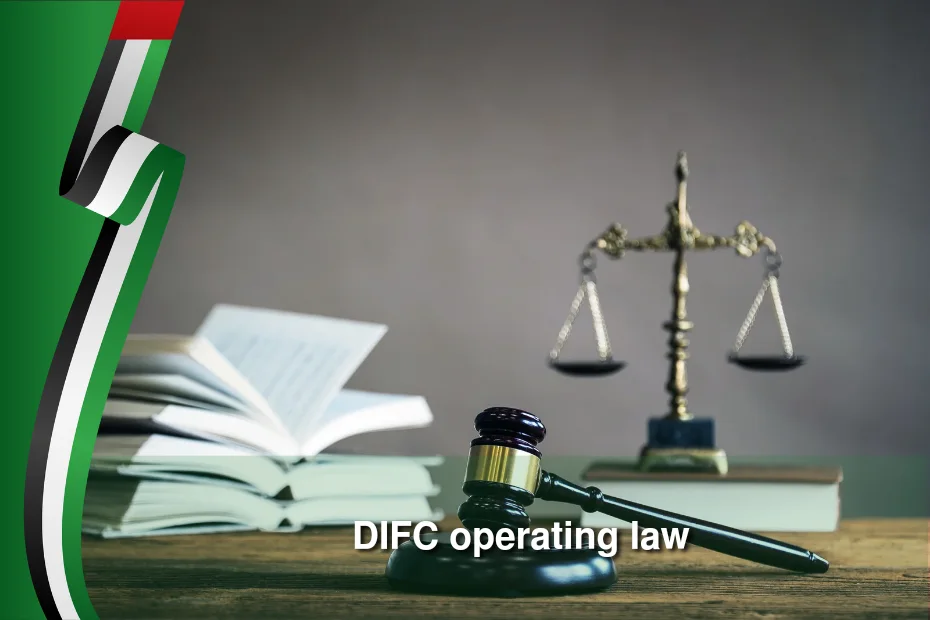The DIFC Operating Law serves as a cornerstone, setting forth the principles under which businesses and entities operate within the center.
This law, enacted on November 7, 2018, and commenced on November 12, 2018, includes comprehensive Operating Regulations 2018 detailing operational norms and related legal frameworks.
This article briefs the DIFC’s operating law essential rules, associated regulations, and legal services for 2024.
Contact Al Mulla Law Firm in UAE. Click the WhatsApp icon below or go to the Contact Us page. Locations: Dubai, Abu Dhabi and Ras Al Khaimah.
Table of Contents
DIFC Operating Law Rules
- Scope and Application: The DIFC Operating Law applies to all entities and individuals conducting business within the DIFC. It sets legal obligations, standards, and procedures for daily operations to ensure compliance and stability. For example, financial institutions must maintain detailed records of their transactions and client interactions to facilitate transparency and regulatory reviews.
- Regulatory Framework: This law establishes the DIFC’s regulatory authority responsible for overseeing compliance, licensing, and corporate practices. This includes monitoring financial activities and enforcing legal standards to maintain the integrity of the financial center. Businesses must, therefore, obtain and periodically renew the appropriate licenses for their operations, providing proof of compliance with DIFC regulations.
- Corporate Governance: DIFC Operating Law mandates companies to adhere to high standards of accountability and transparency in their corporate governance. This involves managing financial records, conducting regular reporting, and disclosing significant operational changes to the DIFC Authority. All DIFC-registered companies are required to submit annually audited financial statements and report any significant operational changes within a specified timeframe.
- Operational Compliance: Entities must adhere to specific rules set out in the Operating Law, including anti-money laundering regulations, data protection policies, and employment laws. Companies are required to implement robust anti-money laundering procedures, including customer due diligence, regular staff training, and the appointment of a compliance officer to oversee these activities.
- Dispute Resolution: The law also outlines mechanisms for resolving disputes through a framework that supports arbitration and mediation, ensuring efficient and fair conflict resolution within the DIFC. In cases of commercial disputes, parties are encouraged to utilize the DIFC Courts or the DIFC-LCIA Arbitration Centre, which are equipped to provide specialized services for the rapid and expert resolution of financial disputes.
Associated Regulations for Operating Law in DIFC
- Companies Law DIFC Law No. 5 of 2018: Companies must maintain a board of directors with at least two members and hold annual shareholder meetings. They are required to disclose financial statements and any significant changes in business operations to the DIFC Authority. The law also outlines detailed procedures and approval requirements for mergers and acquisitions to protect shareholder interests.
- General Partnership Law DIFC Law No. 11 of 2004: Each partner is jointly and severally liable for the partnership’s debts and obligations. Partnerships must also register with the DIFC and submit an annual declaration of compliance.
- Foundations Law DIFC Law No. 3 of 2018: Foundations are required to manage assets in accordance with the stated objectives and purpose defined at the establishment. They must have a board of directors responsible for ensuring compliance with the law and the foundation’s charter.
- Limited Partnership Law DIFC Law No. 4 of 2006 & Limited Liability Partnership Law DIFC Law No. 5 of 2004: Specifies procedures for establishment, including partnership agreements and registration with the DIFC Registrar of Companies. It also limits liability for individual partners to the amount they have invested in the partnership.
- Non-Profit Incorporated Organisations Law DIFC Law No. 6 of 2012 requires regular reporting and public disclosure of financial activities. It also outlines the duties and responsibilities of board members to ensure proper governance and resource use.
Legal Services Related to Operating Law of DIFC
Al Mulla Lawyers, a premier legal firm with extensive expertise in DIFC regulations, offers a comprehensive suite of services designed to assist businesses in navigating the complexities of the DIFC’s legal environment. Their specialized services include:
- Corporate Compliance: Ensuring businesses meet all DIFC regulatory requirements, from company formation to ongoing operations.
- Licensing and Regulatory Advice: Guiding companies through the DIFC licensing process and providing ongoing support to maintain compliance.
- Dispute Resolution: Representing clients in arbitration and litigation within the DIFC courts, ensuring effective management and resolution of disputes.
- Contract Drafting and Review: Crafting and scrutinizing legal documents to align with DIFC laws and protect client interests.
- Legal Consultations on Amendments and Updates: Keeping clients informed about the latest changes in DIFC laws and how they affect their businesses.
FAQs about DIFC Operating Regulation
Conclusion
The DIFC’s operating laws create a sophisticated and secure environment for businesses and financial institutions. With detailed regulations and periodic amendments, such as the Operating Law and Companies Law, the DIFC remains a leading financial hub.
Firms like Al Mulla Lawyers play a pivotal role in guiding entities through these regulations, ensuring that they comply with current laws and are well-prepared for future changes.
This dynamic legal framework helps maintain DIFC’s position at the forefront of global finance.
Contact Al Mulla Lawyers today! Click the Whatsapp icon below or visit our Contact Us page.
Find us at these locations:
– Dubai: Deira, Port Saeed, Street 8, City Avenue Building, Office 705-708.
– Abu Dhabi: Corniche Street, Golden Tower, Office 22.
– Ras Al Khaimah: Al Nakheel, Al Maamoura Building (Emirates NBD Bank Building), Fourth Floor.
Read about DIFC companies law consultation services.
Omar Al Mansoori is an Emirati legal advisor and researcher with over 10 years of experience in civil, commercial, and corporate law in the UAE. He focuses on simplifying complex legal topics and ensuring that every article published aligns with the latest national legislation and official regulations.
